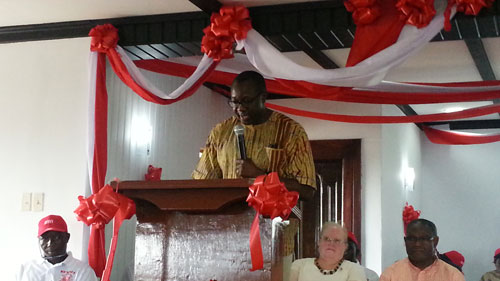 Minister Amara Konneh maintains that Liberia continues to make progress in improving the educational sector but that such feat remains slow and expenditure in the sector poorly prioritized. He warns: “We need to change that.â€
Minister Amara Konneh maintains that Liberia continues to make progress in improving the educational sector but that such feat remains slow and expenditure in the sector poorly prioritized. He warns: “We need to change that.â€
According to Minister Konneh, the share of total spending on education in the national budget is low, at around 12%, although donors provide over half of spending in the sector.
He said over 80% of public spending on education is for employee compensation and that the largest share of public expenditure by level is for higher education, despite it enrolling less than 5% of students, compared to the 80% of students in primary education.
Serving as the keynote speaker at the 85th Founder’s Day Anniversary Celebration of Booker Washington Institute [BWI] in Kakata, Margibi County Saturday, the Treasury Chief explained that the 2010 National School Census puts the nation’s literacy rate for ages 15 to 24 at 79%, increasing from 74% in 2007, but overall literacy is only 57%.
The Keynote speaker said the net enrolment ratio (NER) also climbed from 33% in 2007 to 44% in 2011 while the primary completion rate showed an improvement from 69% in 2007 to 83% in 2009. However, Minister noted that despite these gains, the country is unlikely to meet the 2015 MDG Universal Primary Education target (Liberia MDGs Report 2012).
Minister Konneh also revealed that donor spending in the education sector largely targets primary education, supporting the gap and that public expenditure’s emphasis on higher education, which could represent the need for remedial training, is not consistent with a priority to ensure the poor’s access to free quality basic education.
“The poor outcomes of the sector received international attention in August 2013, when all 24,000 applicants for the University of Liberia’s entrance exam failed, following stricter grading procedures. Technical and vocational education and training also faces challenges, and is poorly aligned with private sector demand,†the tough-speaking Finance Minister said amidst approval by the audience.
Over the years government has contributed resources to the operations of BWI, which Minister Konneh believes were insufficient. The Fiscal Manager disclosed that Government has allocated US$1.8m in the draft national budget for fiscal year 2014/15 for BWI and believes that amount should be increased in order to enable the management of BWI to sustain its current operations and open new opportunities, especially now with the opening of the biomass and other facilities at the school.
In a related development, Minister Konneh said amidst daunting demands of the merger financial resources, the government continues to render subsidies to institutions of higher education because of the value it places on the development of its citizenry.
According to him, government has appropriate from fiscal year 2005/2006 to 2013/2014 about US$97.71 million to institutions of higher learning including the University of Liberia which has received about 64% of this amount. He disclosed other national and private institutions including Tubman University, the Cuttington University, United Methodist University, African Methodists Episcopal University and the African Methodist Episcopal Zion University as well as other community colleges have benefitted from government subsidies.
Minister Konneh asserted that while government remains committed to providing supports to the operation of these institutions of higher learning, it expects the institutions to operate in an efficient manner that generates their own income to enhance the provision of quality services to the students. “…higher education throughout the world is not the full responsibility of governments. The beneficiaries of higher education must be able to pay for it. But in Liberia today, our national university—the University of Liberia, still depends on government to finance the largest share of its operational cost,†Minister Konneh said.
The Fiscal Manager frowned on beneficiaries of higher education who he said must pay a fair price for their education so that they can demand quality services. “The University of Liberia cannot continue to run at US$2.50 per credit hour at the undergraduate level.â€
As the Booker Washington Institute celebrates this 85th Founder’s Day Anniversary under the theme: Turning the Corner at 85, Minister Konneh challenged the faculty, students and alumni to rethink the original vision of its founders, which was to establish an institution that would produce the technical skills necessary for driving the development of Liberia, and provide the model for vocational and technical education in the country.
Given the cardinal role BWI has played in Liberia’s development, Minister Konneh assured government’s unwavering commitment to upholding the original obligation of financing the operations of this institution, and that BWI takes initiatives to begin raising funds through the launch of an endowment fund to be able to provide training the future generation, “we will continue to assist, and explore other means of sourcing supports not only for BWI, but also for other technical and vocational training institutions, because Liberia needs more vocational technical skills today than ever.â€
Meanwhile, the Treasury Chief is urging his cabinet colleagues and the national legislature to reach consensus to begin engaging concessions and other big businesses operating in the country to explore the possibility of collaborating with technical training institutions in developing curricula and training programs that reflect their skill requirements.
This, he pointed out, will not only enable government provides the necessary skills to its young people, but also enable them own their economy by taking over jobs which are most often taken over by aliens and foreigners due to the “lack of required skills for existing jobsâ€. “We must begin efforts aimed at avoiding mismatch of transferred skills to existing jobs.